一般将来时
一般将来时用法总结
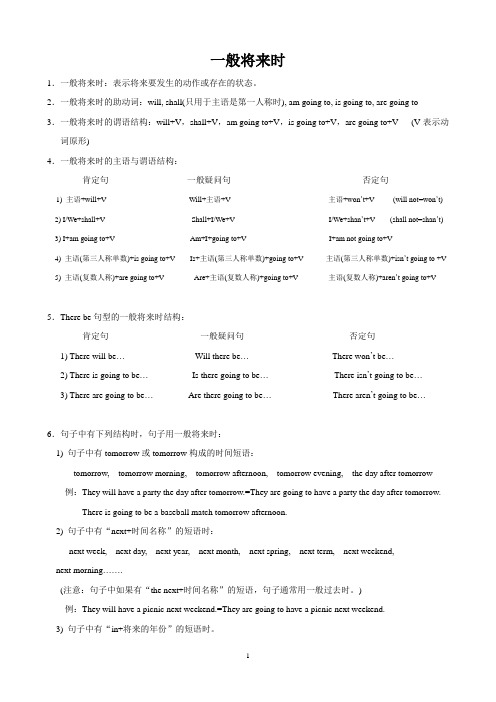
一般将来时1.一般将来时:表示将来要发生的动作或存在的状态。
2.一般将来时的助动词:will, shall(只用于主语是第一人称时), am going to, is going to, are going to3.一般将来时的谓语结构:will+V,shall+V,am going to+V,is going to+V,are going to+V (V表示动词原形)4.一般将来时的主语与谓语结构:肯定句一般疑问句否定句1) 主语+will+V Will+主语+V 主语+won’t+V (will not=won’t)2) I/We+shall+V Shall+I/We+V I/We+shan’t+V (shall not=shan’t)3) I+am going to+V Am+I+going to+V I+am not going to+V4) 主语(第三人称单数)+is going to+V Is+主语(第三人称单数)+going to+V 主语(第三人称单数)+isn’t going to +V5) 主语(复数人称)+are going to+V Are+主语(复数人称)+going to+V 主语(复数人称)+aren’t going to+V5.There be句型的一般将来时结构:肯定句一般疑问句否定句1) There will be…Will there be…There won’t be…2) There is going to be…Is there going to be…There isn’t going to be…3) There are going to be…Are there going to be…There aren’t going to be…6.句子中有下列结构时,句子用一般将来时:1) 句子中有tomorrow或tomorrow构成的时间短语:tomorrow, tomorrow morning, tomorrow afternoon, tomorrow evening, the day after tomorrow 例:They will have a party the day after tomorrow.=They are going to have a party the day after tomorrow.There is going to be a baseball match tomorrow afternoon.2) 句子中有“next+时间名称”的短语时:next week, next day, next year, next month, next spring, next term, next weekend,next morning…….(注意:句子中如果有“the next+时间名称”的短语,句子通常用一般过去时。
一般将来时
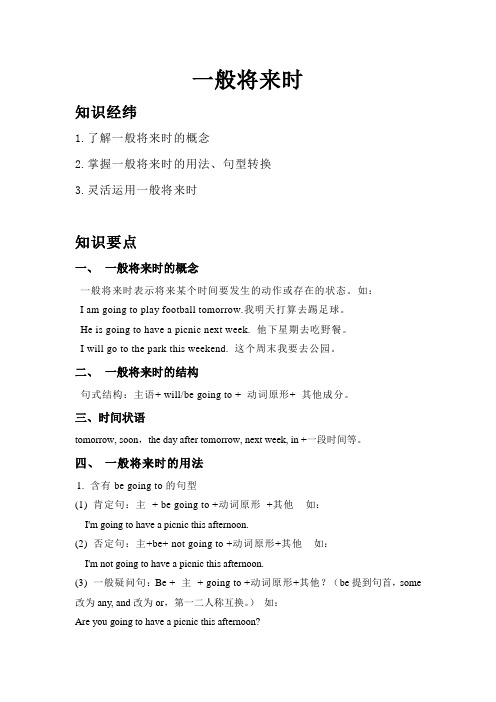
一般将来时知识经纬1.了解一般将来时的概念2.掌握一般将来时的用法、句型转换3.灵活运用一般将来时知识要点一、一般将来时的概念一般将来时表示将来某个时间要发生的动作或存在的状态。
如:I am going to play football tomorrow.我明天打算去踢足球。
He is going to have a picnic next week. 他下星期去吃野餐。
I will go to the park this weekend. 这个周末我要去公园。
二、一般将来时的结构句式结构:主语+ will/be going to + 动词原形+ 其他成分。
三、时间状语tomorrow, soon,the day after tomorrow, next week, in +一段时间等。
四、一般将来时的用法1. 含有be going to的句型(1) 肯定句:主+ be going to +动词原形+其他如:I'm going to have a picnic this afternoon.(2) 否定句:主+be+ not going to +动词原形+其他如:I'm not going to have a picnic this afternoon.(3) 一般疑问句:Be + 主+ going to +动词原形+其他?(be提到句首,some 改为any, and改为or,第一二人称互换。
)如:Are you going to have a picnic this afternoon?肯定回答:Yes, I am.否定回答:No, I’m not.2. 含有will的句型(will可用于所有人称,shall只用于第一人称I和we)( 1 ) 肯定句:主+ will +动词原形+其他如:I will play football tomorrow.(2) 否定句:主+ won’t +动词原形+其他(will后加not成won't)如:I won’t play football tomorrow.(3) 一般疑问句:Will + 主+ +动词原形+其他?(will提到句首,some改为any, and改为or,第一二人称互换) 如:Will you play football tomorrow?肯定回答:Yes, I will.否定回答:No, I won’t.五、一般将来时的特殊疑问句一般情况下,一般将来时的对划线部分有三种情况。
初中英语语法一般将来时

一般将来时一.一般将来时的定义:表示将来某一个时间将要发生的动作或存在的状态,表示将来经常或重复发生的动作。
二.一般将来时的标志:tomorrow(明天),the day after tomorrow(后天)next year(明年)next month(T—个月)next week(下一个星期)3.一般将来时的构成:1.主语^be(am,is,are)going to+动词原形+..例如:(1).I am going to play football tomorrow.明天我将要踢足球.(2).She is going to watch a movie the day after tomorrow.后天她要看一场电影.2.主语+will/shall+动词原形+.....说明:(l).will/shall有时可以和be going to互换;(2) .will是万能的,shall只能用在第一人称,主语是I,we.(3) .will和shall的后而接动词原形)例如shall/will go to Beijing next month.。
will=I11)下个月我将要去北京.(2) .You will come to see me tomorrow.(you will=you'll)明天你将要来看我.(3) .She will read English tomorrow moming.(She will=She'll)明天早上她将要读英语.四.句一般将来时的式:1.肯定句:(1) ..主语+be(am,is,are)going to+动词原形+......(2) ..主语+will/shall+动词原形+.....例句和上面一样,就不举了.2.否定句:(1)..主语+be(am,is,are)not going to+动词原形+......例如:(A):I am not going to play basketball tomorrow.明天我不将踢足球.(B).She is not/isn't going to visit Shanghai next year.明年她不将参观上海.(2)..主语+will/shall not+动词原形+.....(A).I shall not go to school the day after tomorrow o后天我不将上学了(B).I will not write my homework this evening.(will notl=I won't)今晚我不将写作业(C).She will not see a movie next week.(will not=won't)下个星期她将不看一场电影.3.一般疑问句:(A).Am/Is,Are+主语+going to+动词原形+....例如(A).—Am I going to see my grandfather tomorrow?明天我将去看我的爷爷吗?—Yes,you are.是的,你将去.(B).— Are you going to listening to the tape tomorrow?明天你将听录音带吗?—No,I am not.不,我不将.(C). —Is she going to Beijing next year? 明年我将去北京吗?-Yes,she is.是的,她将.(2).Will//shall+主语+动词原形+…例如(A). —Shall we play volleyball next class?下一节课我们将打排球吗?-Yes,you will,是的,你们将.(B). —Will you come here next week?下个星期你将来这儿吗?-Yes,I will.是的,我将.(C).--Will she teach us this term?这学期,她将教我们吗?—Yes,she will.是的,她将.4.特殊疑问句:(1).What(Where,How...)+be(am,is,are)+主语+going to+动词原形+...?例如:(A).—What are you going to do tomorrow? 明天你将要做什么?—rm going to the park? 我将要去动物园.(B).--Where are you going to swim? 你将要去哪儿游泳?—I'm going to swim in the river.(2). What(When,Where,How...)+主语+动词原形+...?例如:(A).---What will you do next week?下个星期你将要做什么?--1 will do my homeworko 我将要做作业.(B).—How will she come here tomorrow?明天她将要怎么来这儿?—She will come here by bus 。
一般将来时
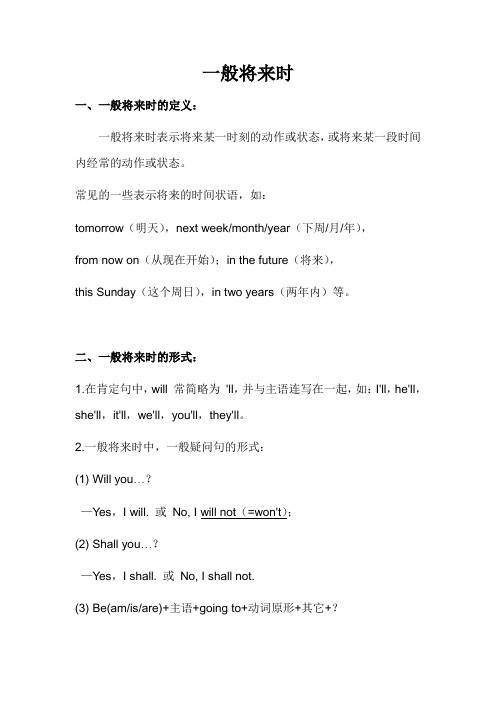
一般将来时一、一般将来时的定义:一般将来时表示将来某一时刻的动作或状态,或将来某一段时间内经常的动作或状态。
常见的一些表示将来的时间状语,如:tomorrow(明天),next week/month/year(下周/月/年),from now on(从现在开始);in the future(将来),this Sunday(这个周日),in two years(两年内)等。
二、一般将来时的形式:1.在肯定句中,will 常简略为'll,并与主语连写在一起,如:I'll,he'll,she'll,it'll,we'll,you'll,they'll。
2.一般将来时中,一般疑问句的形式:(1) Will you…?—Yes,I will. 或No, I will not(=won't);(2) Shall you…?—Yes,I shall. 或No, I shall not.(3) Be(am/is/are)+主语+going to+动词原形+其它+?如:Are you going to swim tomorrow?—Yes, I am./ No, I'm not.Is he/she going to play football next weekend?—Yes, he/she is./ No, he/she isn't.Are they going to go shopping this Sunday?—yes, they are./ No, they aren't.三、一般将来时的用法:1.一般将来时由“助动词shall(用于第一人称),或者will(用于第一、二、三人称)+动词原形”构成。
这种将来意义常常夹杂着情态意义即带有说话人的主观态度和看法,比如表示“预见”。
有时也含有“意愿”或“意图”的意思。
一般将来时
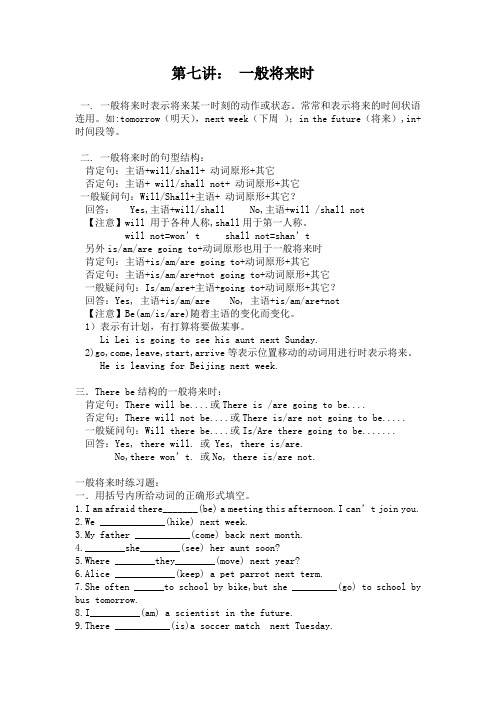
第七讲:一般将来时一. 一般将来时表示将来某一时刻的动作或状态。
常常和表示将来的时间状语连用。
如:tomorrow(明天),next week(下周);in the future(将来),in+时间段等。
二. 一般将来时的句型结构:肯定句:主语+will/shall+ 动词原形+其它否定句:主语+ will/shall not+ 动词原形+其它一般疑问句:Will/Shall+主语+ 动词原形+其它?回答: Yes,主语+will/shall No,主语+will /shall not【注意】will 用于各种人称,shall用于第一人称。
will not=won’t shall not=shan’t另外is/am/are going to+动词原形也用于一般将来时肯定句:主语+is/am/are going to+动词原形+其它否定句:主语+is/am/are+not going to+动词原形+其它一般疑问句:Is/am/are+主语+going to+动词原形+其它?回答:Yes, 主语+is/am/are No, 主语+is/am/are+not【注意】Be(am/is/are)随着主语的变化而变化。
1)表示有计划,有打算将要做某事。
Li Lei is going to see his aunt next Sunday.2)go,come,leave,start,arrive等表示位置移动的动词用进行时表示将来。
He is leaving for Beijing next week.三.There be结构的一般将来时:肯定句:There will be....或There is /are going to be....否定句:There will not be....或There is/are not going to be.....一般疑问句:Will there be....或Is/Are there going to be.......回答:Yes, there will. 或 Yes, there is/are.No,there won’t. 或No, there is/are not.一般将来时练习题:一.用括号内所给动词的正确形式填空。
一般将来时
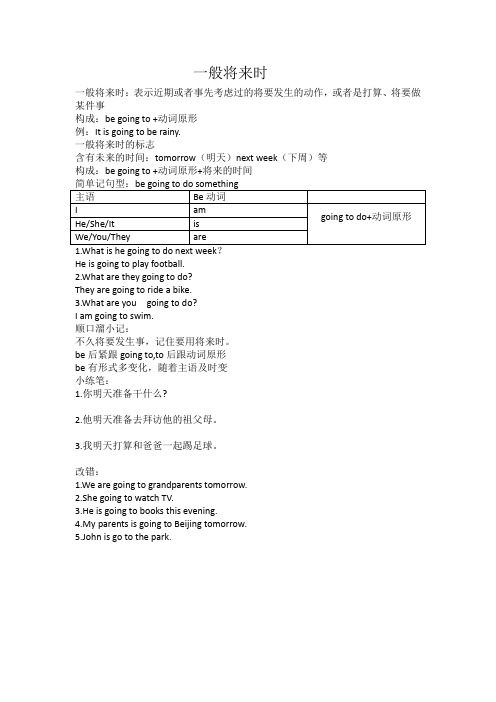
一般将来时
一般将来时:表示近期或者事先考虑过的将要发生的动作,或者是打算、将要做某件事
构成:be going to +动词原形
例:It is going to be rainy.
一般将来时的标志
含有未来的时间:tomorrow(明天)next week(下周)等
构成:be going to +动词原形+将来的时间
He is going to play football.
2.What are they going to do?
They are going to ride a bike.
3.What are you going to do?
I am going to swim.
顺口溜小记:
不久将要发生事,记住要用将来时。
be后紧跟going to,to后跟动词原形
be有形式多变化,随着主语及时变
小练笔:
1.你明天准备干什么?
2.他明天准备去拜访他的祖父母。
3.我明天打算和爸爸一起踢足球。
改错:
1.We are going to grandparents tomorrow.
2.She going to watch TV.
3.He is going to books this evening.
4.My parents is going to Beijing tomorrow.
5.John is go to the park.。
一般将来时的定义、结构、例句、用法
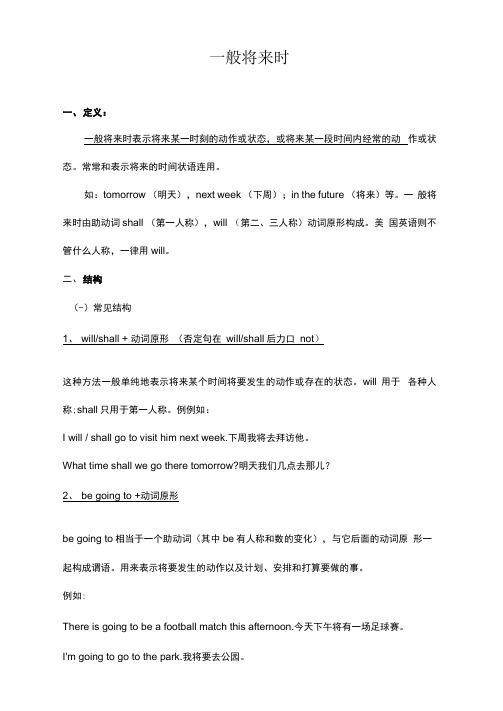
一般将来时一、定义:一般将来时表示将来某一时刻的动作或状态,或将来某一段时间内经常的动作或状态。
常常和表示将来的时间状语连用。
如:tomorrow (明天),next week (下周);in the future (将来)等。
一般将来时由助动词shall (第一人称),will (第二、三人称)动词原形构成。
美国英语则不管什么人称,一律用will。
二、结构(-)常见结构1、will/shall + 动词原形(否定句在will/shall后力口not)这种方法一般单纯地表示将来某个时间将要发生的动作或存在的状态。
will用于各种人称;shall只用于第一人称。
例例如:I will / shall go to visit him next week.下周我将去拜访他。
What time shall we go there tomorrow?明天我们几点去那儿?2、be going to +动词原形be going to相当于一个助动词(其中be有人称和数的变化),与它后面的动词原形一起构成谓语。
用来表示将要发生的动作以及计划、安排和打算要做的事。
例如:There is going to be a football match this afternoon.今天下午将有一场足球赛。
I'm going to go to the park.我将要去公园。
(-)常用结构1、用于"I expect, I'm sure, I think, I wonder 等的宾语从句"中。
Don't worry about the exam. I'm sure you'll pass.不要担心这次考试,我确信你会通过的。
2、用于祈使句和陈述句中。
Work hard and you will succeed.如果你努力,就会成功的。
3、与表示时间或条件的状语从句连用。
一般将来时总结
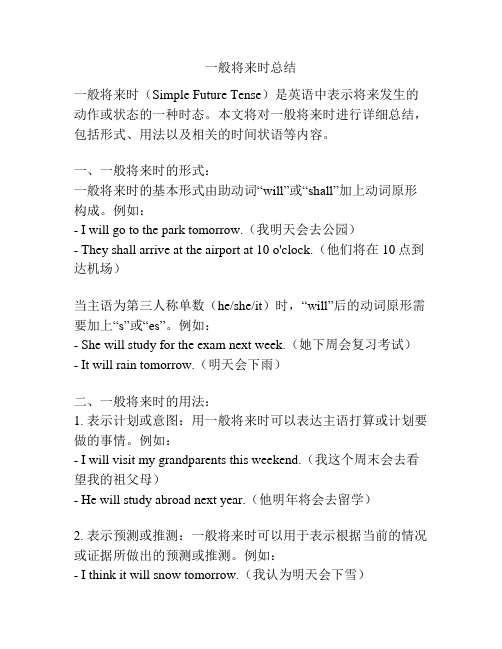
一般将来时总结一般将来时(Simple Future Tense)是英语中表示将来发生的动作或状态的一种时态。
本文将对一般将来时进行详细总结,包括形式、用法以及相关的时间状语等内容。
一、一般将来时的形式:一般将来时的基本形式由助动词“will”或“shall”加上动词原形构成。
例如:- I will go to the park tomorrow.(我明天会去公园)- They shall arrive at the airport at 10 o'clock.(他们将在10点到达机场)当主语为第三人称单数(he/she/it)时,“will”后的动词原形需要加上“s”或“es”。
例如:- She will study for the exam next week.(她下周会复习考试)- It will rain tomorrow.(明天会下雨)二、一般将来时的用法:1. 表示计划或意图:用一般将来时可以表达主语打算或计划要做的事情。
例如:- I will visit my grandparents this weekend.(我这个周末会去看望我的祖父母)- He will study abroad next year.(他明年将会去留学)2. 表示预测或推测:一般将来时可以用于表示根据当前的情况或证据所做出的预测或推测。
例如:- I think it will snow tomorrow.(我认为明天会下雪)- They believe she will win the competition.(他们相信她会赢得比赛)3. 表示意愿或允诺:一般将来时可以表达主语的意愿或承诺要做某事。
例如:- I will help you with your homework.(我会帮你做作业)- He will stop smoking.(他将戒烟)4. 表示预定的事件或安排的计划:一般将来时可以用于表示已经安排好的事件或计划。
- 1、下载文档前请自行甄别文档内容的完整性,平台不提供额外的编辑、内容补充、找答案等附加服务。
- 2、"仅部分预览"的文档,不可在线预览部分如存在完整性等问题,可反馈申请退款(可完整预览的文档不适用该条件!)。
- 3、如文档侵犯您的权益,请联系客服反馈,我们会尽快为您处理(人工客服工作时间:9:00-18:30)。
一.一般将来时:表示将来某个时间(相对于讲话时间)将要发生或存在的状态,也表示将来的一段时间内经常或反复发生的动作,常与表示将来的时间连用,如下:tomorrow明天the next time下一次the day after tomorrow后天next week下周next year明年tomorrow evening明天晚上in the future将来later(on)以后before long不久后其基本句型如下:(一)will:will+动词原形,可以用于第一,第二,第三人称及其复数(不分人称)。
<1>陈述句肯定句:主语+ will + 动词原形(+将来的时间或地点).否定句:主语+ won’t + 动词原形(+将来的时间或地点)例句:I will play the piano at the concert.我将要在音乐会上弹钢琴。
I won’t go to school tomorrow.我明天不上学。
<2>特殊疑问句特殊疑问词+will+人称+动原+将来的时间?答句:人称+will+动词原形.例句:What will you be in the year 2050? 2050年你将会成为什么?I will be a doctor.我将会成为一个医生。
<3>一般疑问句Will+人称+动词原形(+将来的时间或地点)?答句:Yes,人称+will. No,人称+won’t.例句:Will you visit your grandparents this Saturday? 这周六你是否去拜访你的爷爷奶奶?Yes, I will.(二)shall:shall+动词原形,只能用于第一人称的单复数(I, we)<1>陈述句肯定句:I/We shall + 动词原形(+将来的时间或地点)。
我/我们将要…否定句:I/We shall not + 动词原形(+将来的时间或地点)。
我/我们将不会…<2>特殊疑问句:特殊疑问词+ shall + 人称+ 动词原形(+将来的时间)?答语:I/We shall + 动词原形例如:What shall we do?我们该怎么办?Where shall I go?我该去哪呢?<3>一般疑问句Shall I / we + 动词原形(+将来的时间或地点)?答语:Yes, I / we shall. No, I / we shall not.例句:Shall I/ we go to school tomorrow? 我/我们明天将要上学吗?Yes, we shall. No, we shall not.(三)be going to结构,根据人称及单复数变换系动词be的形式(am, is, are)。
*(1)be going to +动词原形,表示将来要做某事或发生某事。
(2)be going to + 地点,表示将要去某地(3)be going there/here.将要去那里/这里一、单项选择。
1. There __________ a meeting tomorrow afternoon.A. will be going toB. will going to beC. is going to beD. will go to be2. Charlie ________ here next month.A. isnt workingB. doesnt workingC. isnt going to workingD. wont work3. He ______ very busy this week, he ________ free next week.A. will be; isB. is; isC. will be; will beD. is; will be4. There ______ a dolphin show in the zoo tomorrow evening.A. wasB. is going to haveC. will haveD. is going to be5. –________ you ________ free tomorrow?–No. I ________ free the day after tomorrow.A. Are; going to; willB. Are; going to be; willC. Are; going to; will beD. Are; going to be; will be6. Mother ________ me a nice present on my next birthday.A. will givesB. will giveC. givesD. give7. –Shall I buy a cup of tea for you?–________.A. No, you wont.B. No, you arent.C. No, please dont.D. No, please.8. –Where is the morning paper?–I ________ if for you at once.A. getB. am gettingC. to getD. will get9. ________ a concert next Saturday?A. There will beB. Will there beC. There can beD. There are10. If they come, we ________ a meeting.A. haveB. will haveC. hadD. would have11. He ________ her a beautiful hat on her next birthday.A. givesB. gaveC. will givingD. is going to giving12. He ________ to us as soon as he gets there.A. writesB. has writtenC. will writeD. wrote13. He ________ in three days.A. coming backB. came backC. will come backD. is going to coming back14. If it ________ tomorrow, well go roller-skating.A. isnt rainB. wont rainC. doesnt rainD. doesnt fine15. –Will his parents go to see the Beijing opera tomorrow?–No, ________ .A. they willnt.B. they wont.C. they arent.D. they dont.16. Who _____ we ______ swimming with tomorrow afternoon?A. will; goB. do; goC. will; goingD. shall; go17. We ________ the work this way next time.A. doB. will doC. going to doD. will doing18. Tomorrow he ________ a kite in the open air first, and then ________ boating in the park.A. will fly; will goB. will fly; goesC. is going to fly; will goesD. flies; will go19. The day after tomorrow they ________ a volleyball match.A. will watchingB. watchesC. is watchingD. is going to watch20. There ________ a birthday party this Sunday.A. shall beB. will beC. shall going to beD. will going to be21. They ________ an English evening next Sunday.A. are havingB. are going to haveC. will havingD. is going to have22. ________ you ________ free next Sunday?A. Will; areB. Will; beC. Do; beD. Are; be23. He ________ there at ten tomorrow morning.A. willB. isC. will beD. be24. ______your brother ______ a magazine from the library?A. Are; going to borrowB. Is; going to borrowC. Will; borrowsD. Are; going to borrows25. –Shall I come again tomorrow afternoon?–________ .A. Yes, pleaseB. Yes, you will.C. No, please.D. No, you wont.26. It ________ the year of the horse next year.A. is going to beB. is going toC. will beD. will is27. ________ open the window?A. Will you pleaseB. Please will youC. You pleaseD. Do you28. –Lets go out to play football, shall we?–OK. I ________.A. will comingB. be going to comeC. comeD. am coming29. It ________ us a long time to learn English well.A. takesB. will takeC. spendsD. will spend30. The train ________ at 11.A. going to arriveB. will be arriveC. is going toD. is arriving改句子。
